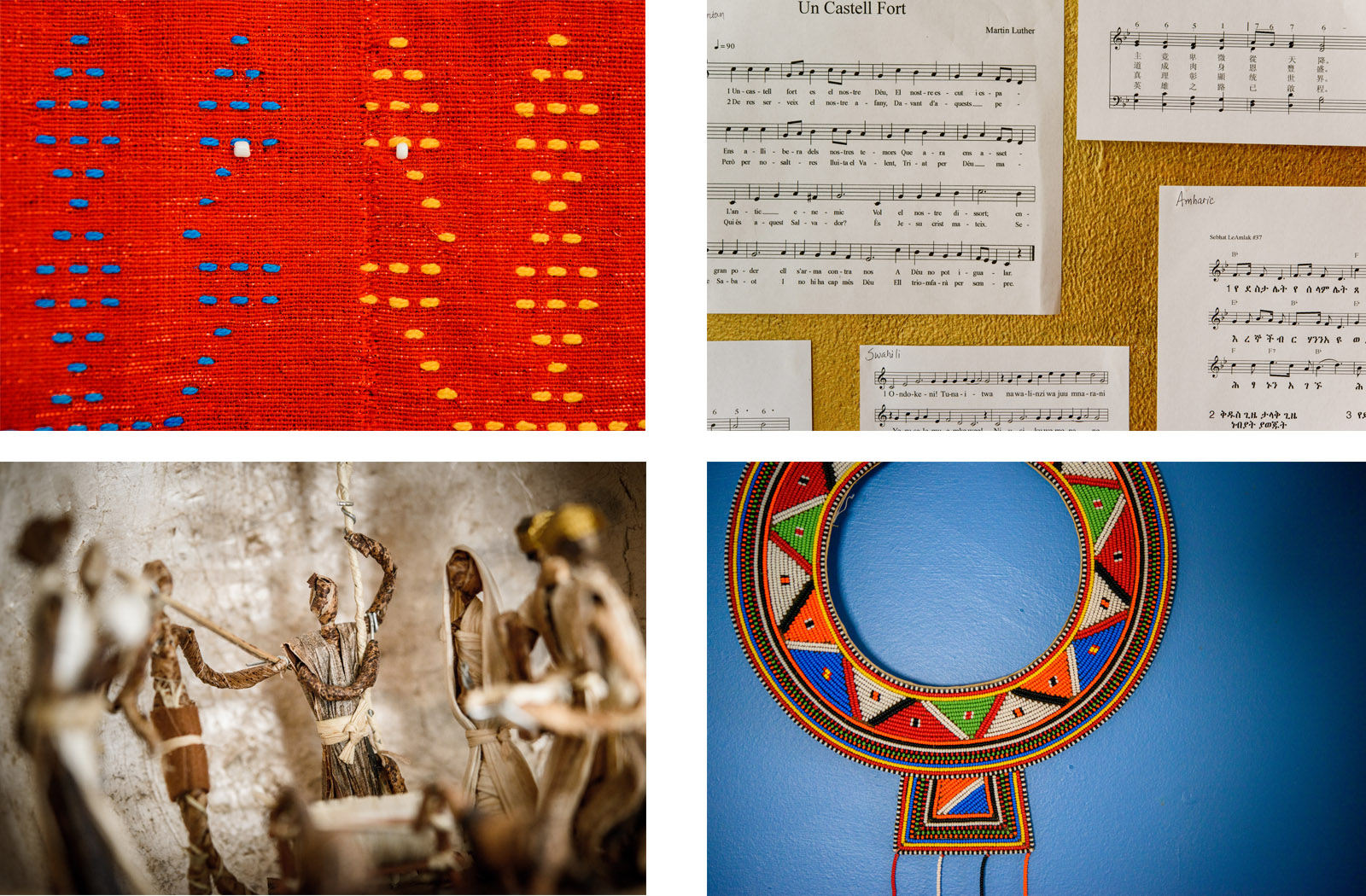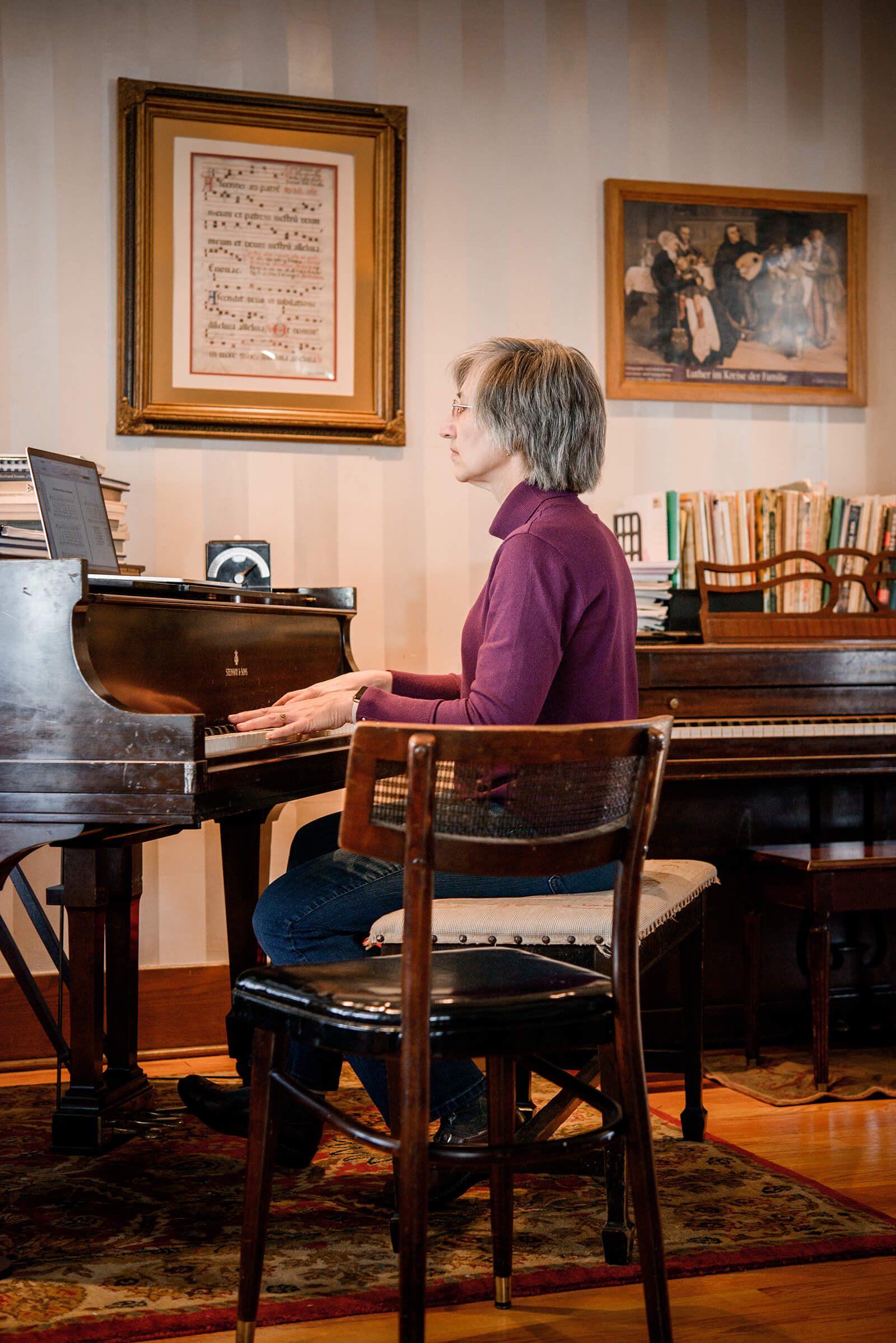Let Every Tongue Praise the Lord
Deaconess Sandra Rhein assists Lutheran church bodies around the world in creating a hymnal of their own.
Watch the hymnal project in actionDeaconess Sandra Rhein sits at the piano in a classroom at Concordia Theological Seminary, Fort Wayne, Ind. (CTSFW). Tsegahun Assefa Adugna, director of Children and Youth Ministries for the Ethiopian Evangelical Church Mekane Yesus (EECMY), stands close by. As Rhein plays the piano, Tsegahun closes his eyes, leans his head back and begins to sing a hymn.
The hymn, “When I Behold Jesus Christ” (Lutheran Service Book 542), was written in the 1960s by a 16-year-old Ethiopian girl named Almaz Belhu, and Tsegahun sings it in the original language of Amharic. It is Tsegahun’s skill in both Amharic and English that has brought him together with Rhein to work on a new hymnal for the EECMY. Rhein serves as consultant on the project, which is scheduled for completion later this year.
Rhein never expected to be a hymnal consultant or, for that matter, a deaconess. With a bachelor’s degree in Music Education from the University of Nebraska—Lincoln, she has long served the Church as an organist and choir director, and she had planned to pursue a master’s degree in organ or church music after her children were grown.

Deaconess Sandra Rhein at her home in Indiana.
But around the time that she might have begun, she heard about the deaconess program at CTSFW: “I had only a vague notion of this thing called ‘deaconess,’ but after several pastors encouraged me to look into it … I checked out the program. There was no turning back. The opportunity to study theology and the formation as a servant of mercy was compelling.”
How did a decision to pursue deaconess studies lead Rhein to become an international hymnal consultant?
“One of my classmates at the seminary was [the] Rev. Isaiah Obare, who is from Kenya. Through our friendship, I became interested in the Lutheran Church in Kenya and wrote a paper called ‘Toward a Theology of Mercy: Hymnody as Bodily Care to the Church in Kenya,’” Rhein explains. “Isaiah’s father, the Rev. Dr. Walter Obare, who was archbishop of the Evangelical Lutheran Church in Kenya (ELCK) at the time, had asked the LCMS for assistance in developing a hymnal. Bishop Obare asked if I would help, a request that I took to my professors at the seminary, and a hymnal project was developed, with me as coordinating editor.”
That hymnal, Ibada Takatifu (which means “Divine Service”), was completed in 2012 in the Swahili language. Rhein is now working on hymnals in Amharic, Mandarin Chinese and Indonesian, thanks to generous grants from the Marvin M. Schwan Charitable Foundation.

A variety of fabrics and gifts given to Rhein from her work around the world, including sheet music in different languages.
‘Christ Must Be Heard’
To shepherd a new hymnal from conception to completion is no simple process. To do it in a language that you don’t know, in a faraway country with limited resources and unreliable technology, is more complicated still.
The first and most difficult step, according to Rhein, is to find someone who can translate hymn and liturgical texts into the language of the new hymnal. Not only does the translator need to know both his native language and English, but he is ideally also knowledgeable in theology and skilled in music and poetry, since all of those come into play in the translation process.
Much of the work is completed with Rhein seated at the piano, listening to the translator “to see if the words flow naturally. One can only tell this,” Rhein says, “by singing the hymns over and over. The rhythm of the words needs to fit naturally with the rhythm of the melody. … We want hymns to stick with people … so they need to fit really well.”
The Rev. Eben Ezer, a pastor in the Indonesian Christian Lutheran Church, is serving as translator for the Indonesian hymnal project. He says the process is difficult because “one word in English could become two or four words in Indonesian.”
He begins by trying to understand the text theologically — “Christ must be heard,” he says, ensuring that the proclamation of Jesus’ death and resurrection for the forgiveness of sins is retained and emphasized in the translation — and then proceeds to work with Rhein on setting the text to music. When text and music fit, “it is amazing. It means that what we have done is not … in vain. … The Lord works through this.”
The translation process brings together not only two languages, but two cultures. Working with Tsegahun, who freely embellishes as he sings, Rhein aims to write down “a clear melody … that doesn’t contradict … the style that is part of [Ethiopian] culture. There’s no reason to block that.”
Once the hard work of translating texts and writing down melodies is done, the more practical work begins: entering the material into the computer, securing copyrights, passing theological review, proofreading, laying out and designing the hymnal, contracting with a publisher for printing and shipping, making audio recordings for training purposes, and holding workshops to introduce the new hymnal to those for whom it was made.

Rhein plays a piece of music at her home in Indiana.
‘One in the Body of Christ’
Now that she has begun work on her fourth hymnal project, Rhein says she gets requests almost weekly from people asking, “Can you come do a hymnal for us?” She stresses, though, that “the LCMS doesn’t go to other church bodies and offer to do a hymnal. That would be presumptuous.”
Instead, a church body must make an official request to the LCMS. Then the LCMS Office of International Mission must decide to pursue the project, after which the leader of the church body (not the LCMS) appoints a hymnal committee. This is where the LCMS comes in, providing a consultant to serve on the committee and be a liaison to the Synod.
Before the project ever begins, there are many questions to be answered: What hymns does the church body already have? What does their Sunday morning worship look like? Is there already an understanding of the liturgy, or is that something that will be taught through the hymnal?
Rhein begins to answer some of these questions by attending services in the church to get a feel for the culture of both the people and their worship life.
To those who ask, “Why do people for whom a hymnal has not been required in the past suddenly need one now?” Rhein emphasizes that a hymnal is not just a songbook.
“The songs are just one part … because for Lutheran worship it is far more than just singing hymns. … We believe and teach that Jesus won the forgiveness of sins on the cross, and we receive that forgiveness in the Sacraments. Hymnals aid our liturgical life by providing the structure and setting for the Divine Service,” she says. “Especially in places where the Church is just beginning, the hymnal is a resource for pastors to bring God’s gifts to His people.”
Although there may be many cultural differences, “people worldwide are profoundly alike when it comes to our need for Christ,” she says. Noting the common worship elements she encounters, even as so many different service variations and kinds of music are used, she continues: “One of the biggest joys ever is when I go to church with [those in another country] and I don’t know the language — I can’t understand a single word — and yet I know where we are in the service because of the liturgy.”
Through the Word and Sacraments, “we truly are one in the Body of Christ,” she says.
Fast Facts: Hymnal Projects
Kenyan Hymnal
- Title: Ibada Takatifu
- Language: Swahili
- For: Evangelical Lutheran Church in Kenya
- Progress: Completed in 2012
Ethiopian Hymnal
- Language: Amharic
- For: Ethiopian Evangelical Church Mekane Yesus
- Progress: Begun in 2014, scheduled for completion in 2018
Chinese Hymnal
- Language: Mandarin Chinese
- For: The Lutheran Church—Hong Kong Synod, China Evangelical Lutheran Church in Taiwan and Lutherans in mainland China
- Progress: Test booklet with one setting of Divine Service and 50 hymns scheduled for completion in 2018
Indonesian Hymnal
- Language: Indonesian
- For: Indonesian Christian Lutheran Church
- Progress: Hymnal committee has been formed, and it met for the first time in October 2017
Learn More
- Read a past interview with Deaconess Sandra Rhein: blogs.lcms.org/2015/10-questions-with-deaconess-sandra-rhein
Pray with Us
Lord of all nations, on Pentecost, through Your apostles, You spoke in many languages to people from various nations. In Your Word, You teach us to speak to one another in hymns and songs. Bless the work of Deaconess Sandra Rhein and those who work with her to provide hymnals in tongues spoken by Your people throughout the world. May the whole Church continually rejoice that we are one in Christ, as every tongue in every language joins together to sing Your praise. Through Jesus Christ, who lives and reigns with the Father and the Holy Spirit, one God, now and forever. Amen.
Share Jesus with the World
Your generosity today makes possible your Synod’s witness and mercy efforts both at home and abroad.
Give now
Are you looking to direct your gifts for work that’s more specific?
Visit the LCMS online ministry and mission catalog to find those opportunities most meaningful to you!
Don’t see what you’re looking for?
Contact LCMS Mission Advancement at 888-930-4438 or mission.advancement@lcms.org to talk about all the options available.

